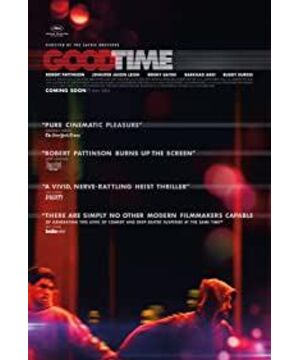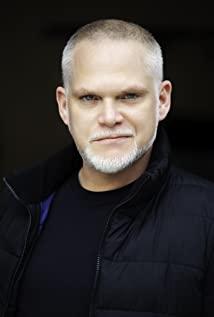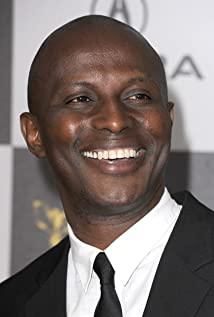one
After watching "Good Times" by the Safdie Brothers, I have been thinking about what is the real "Good Times" for the protagonists in the film. Throughout the film, the story line has been centered on Connie's "first-person" perspective, what he experienced, fought for, and abandoned in one night, which should be the "good times" in the eyes of him and the Safdie brothers. Bar?
To some extent yes. In the opening scene, Connie and his brother successfully walked out of the bank, fled to the alley and struggled to take off their masks. He hugged his brother, who was still a little out of breath, and kept encouraging him "Look, you did it, really Incredible", this thrilling afterlife, and the treasure at hand, must be a "good time" for him.
In the middle of the film, when she learned that the hospital where her younger brother was placed, Connie went straight to Huanglong alone, robbed "him" from the eyes of the police guards, and finally found a temporary hiding place after several attempts. It was late at night, there were no lights in the house, and the shaking screen of the TV provided the only remaining light, and he suddenly said to the little girl, "I feel that something important is happening, and it is with me why I am sitting here at this moment. closely related", the emotion of a desperado, lamenting that he "should not die", at least that moment must be "a good time".
In the end, Connie, who was getting deeper and deeper, was no match for the French Open, and her last strength was exhausted in the "cat and mouse chase" on the rooftop. He still had a grim expression on his face, staring at us across the screen with wide eyes, reluctant to look back for a long time, and seemed unwilling to say goodbye to the "good times". Immediately after the style of painting changed, younger brother Nick played the game Cross the room under the guidance of a psychiatrist, once, twice, three times... Finally, he finally stepped forward, moving towards order, towards obedience to the majority. The "good times" in Connie's eyes were officially over here.
two
Put aside the discussion of the topic for the time being, and return to the film itself. In my opinion, "Good Times" is a work that needs to be interpreted "situationally". The third feature film of the Safdie brothers is more like "Hot Afternoon", "After get off work" and "Mean Streets". And the "after reading" of films such as Cassavetes. The background of the story, the ins and outs, the relative lack of social motivation, and the over-emphasis on the protagonist Connie make many themes of the film less able to withstand too much pondering and discussion - and this is also "Good Times". The place. For example, in New York in the film, we learn in the first glimpse that Nick is receiving psychotherapy in a high-rise building on the Lower East Side of Manhattan. Before and after the scene of the amusement park, there are two overhead shots of Connie driving through Queens. , the background of New York is cold and alienated in the film, and there is not much "communication" between the characters and the audience. Therefore, we had to use other films depicting New York to reconstruct the world in the eyes of Connie, and the world of images in the eyes of the Safdie brothers who grew up in the city.
Another example is the status symbol of Nick's character. Even though the misfortune of personal destiny is often accompanied by crime and uncompromising on the power system, the director focuses on Nick's psychotherapy process twice at the beginning and end of the film. pointed to. The "spiritual therapy group portrait" in the last scene, and Connie's heroic resistance to the existing power system time and time again throughout the film, and using the "correct way" in their own eyes to achieve the salvation of the younger brother, we are easily reminiscent of McMurphy played by Jack Nicholson in "One Flew Over the Cuckoo's Nest", and the image of "The Asylum" in that work. In "Good Times", the two characters Connie and Nick are forcibly tied together, and it is even unreasonable to attribute the motivation behind Connie's series of destructive behaviors to "saving" his younger brother. It is difficult to justify the deliberation and reproduction of a situation. Coincidentally, one of the directors, who also plays Nick, Ben Safdie, has "One Flew Over the Cuckoo's Nest" among his favorite films.
"Good Times" is a soup that is half boiled, many good ingredients have been poured into the pot, the "treatment" faced by the disadvantaged, the destruction of order by the rebels, the streets of Queens, New York long In the night, there is also the oppressive mirror movement and excellent electronic soundtrack support, but the "chemical reaction" between the various ingredients is not mature enough, and drinking it gives people a "somewhat interesting" Aftertaste" is not enough regret.
three
Back to the discussion of the word "good times". The usual explanation is that this is actually irony, where is the "good time" in a story where the characters keep repeating "I'm fucked up" throughout? What kind of "good time" is Connie who was too busy to save her younger brother? What happened to this, Ray, who was rescued by mistake, finally fell to his death, the black security guard in the amusement park almost took his life, and the ignorant black girl was innocently implicated. No one had a good time this night.
More than this night. Even if he succeeds in rescuing his younger brother, will Connie's fate be rewritten? For black security guards and little girls, Connie is probably not the only "white man" who has the ability to "package" them as murderers; after a night, the sirens in the Queens block will not stop, and bail usury will be issued of creditors, and customers continue to come... "Good Times" is reminiscent of the film work of the 1970s and that time, New York at that time - the Safdie brothers and Robert Pattinson at this time, right? What about Martin Scorsese and Robert De Niro? Shootings, crime, cops and outlaws, alcohol, drugs, rebellion and unrestrainedness are all things that Good Times really had in common with the "genre" of its time.
However, even the directors themselves said that they didn't want to make "Good Times" a "genre", but only wanted to portray America today. Hope it goes as you wish, but how do you comment on this moment? The 21st century has entered its seventeenth year, and this is still a society in which everyone breathes free air but "remains in their own place". Everyone "performs their own duties", sticks to their duties, and has nothing to do with each other. : Doctors heal people, patients will be treated when they are sick, the police will arrest the murderers, and the murderers will be arrested if they resist. In the face of morality and justice, the color of black and white is still ambiguous, and the rich seem to continue to be rich, It seems that it is difficult for the poor to escape the fate of the previous generation...
I don't have to think about it anymore, because at this point, I prefer to trust my initial judgment. Putting aside the above interpretation, the so-called "good times" should be the period or those few beautiful moments in the eyes of the unfortunate Connie. Here, "good times" should have nothing to do with whether the society is messy or orderly, regardless of the rules and "truths" defined by most people, and whether there is an equivalent exchange between money and life, it should only follow Our own humble hearts. The movie "Good Times" doesn't want to reveal or call for anything. It's just a character sketch, showing us as much as possible the world in Connie Nikas's eyes, the predicaments he faces, and the beauty in his mind.
Four
On the weekends, I went to a friend's house for a barbecue, on the sunny lawn, and enjoyed the wine. There was not a cloud of sorrow in the sky. I took time to think about this movie from time to time, but I couldn't figure out where the "good" was. In the blink of an eye on Monday, I dressed up to go to work and continued to drown in the vast sea of people and traffic in Greater New York. Walking alone in the shadows of tall buildings, thinking about what I'm facing and what's coming, I can't help but sigh at the insignificance of manpower. It was then that I suddenly remembered Connie and the last moment he looked back. Staring at him for a while, I began to understand the power behind Good Times.
View more about Good Time reviews











